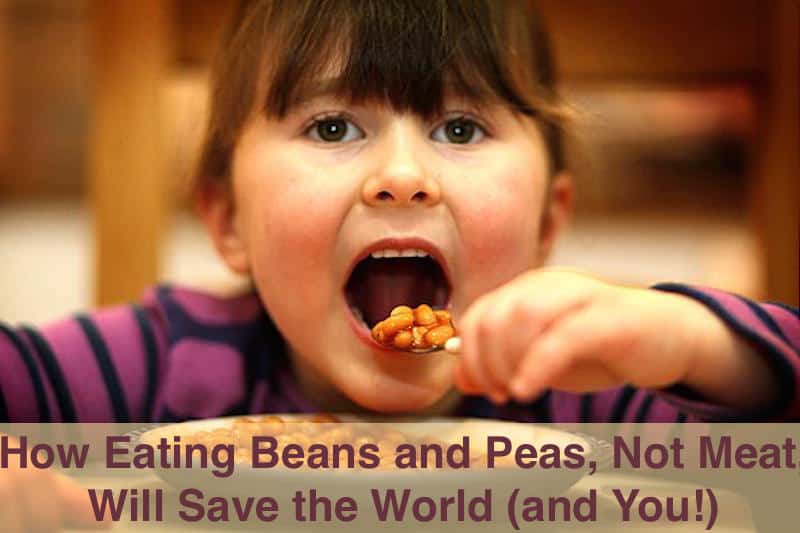How Eating Beans and Peas, Not Meat, Will Save the World (and You!)
How in the world could eating beans and peas save the world, not to mention making you healthier and live longer? Well, read on, watch the videos and let three doctors tell the tale.
AS I write this, as many as seven million people have been told to evacuate their homes in Florida as tropical storm “Irma” approaches after leaving a wake of devastation in Cuba and across the Caribbean. (1)
At the same time, Houston, Texas is cleaning up the debris caused by a “once-in-500-year” flood storm from “Harvey” that trounced the city last week, just 16 years after another disastrous “once-in-500-year” flood named “Allison” occurred in the Houston area in 2001. (2)
Feeling anxious?
I’m wondering what’s up ahead in my neck of the woods. I live in the San Francisco Bay Area, a place that’s unlikely to be smashed by a tropical storm. Small solace, because this is earthquake country.
“California could be hit by an 8.2 mega-earthquake, and damage would be catastrophic” cries out yesterday’s edition of the LA Times, noting that a “magnitude 8.2 earthquake that ravaged southern Mexico on Thursday [two days ago] was the largest to shake the country in nearly a century.” (3)
Yeah, some anxiety kinda makes sense, and is in fact an emerging condition referred to as “Ecoanxiety”, described by the American Psychological Association as the dread and helplessness evoked by “watching the slow and seemingly irrevocable impacts of climate change unfold, and worrying about the future for oneself, children, and later generations.”
So, what pray tell does Ecoanxiety and natural disasters have to do with eating beans and peas, and how in the heck would eating beans and peas save the world?
Well, grasshopper, that’s what this article aims to show you; moreover, you’ll not only learn a wee little bit you can do to help the planet, but your health as well, all by simply eating less meat and more beans and peas — 0r, in a word, legumes.
Now before you yell at me: I rather cut off my left leg and give up my cheeseburger, you tree-hugging- eco-terrorist, please understand that my suggestion isn’t to give up meat completely, but to reduce your consumption of it.
As I’m about to show you, if we reduce our consumption of meat, good things happen. And I say with confidence, these are “good things” you want.
In this article, you’ll discover:
- How raising beef messes with the planet;
- Why substituting beans for beef would improve not only the earth’s health, but yours;
- How legumes (like beans) can improve longevity; and
- The potential for plants (like peas) to provide the world’s population with protein while masquerading as meat.
Let’s dive in…
Eat More Beans and Save Yourself
Ever notice how the health of the planet and your own health are all tangled up together?
Like if you live next to a toxic waste dump for 20 years and then “suddenly” get cancer. Or if you’re part of a industrialized society that spews enough green house gases into the atmosphere for about a 100 years, and the climate starts changing and with it mega storms that chase you from your home.
Then there’s your very own personal environment, your body. Did you know that eating beans and peas can make your healthier; even live longer?
A Better Environment With Beans
I know I said earlier that my intent was not to convince you to abandon meat entirely, but just to get a sense of the impact of a meat-centric diet, consider what Dr. Helen Harwatt and a team of scientists from Oregon State University, Bard College, and Loma Linda University discovered.
Dr. Helen Harwatt is a researcher trained in environmental nutrition, a field focused on developing food systems that balance human health and sustainability.
A recent article penned by James Hamblin, MD in the Atlantic magazine titled, If Everyone Ate Beans Instead of Beef profiled Dr. Harwatt’s and her team’s research about what would happen if every American made one dietary change: substituting beans for beef.
They calculated that if everyone were willing and able to substitute beans for beef, the U.S. could still come close to meeting its 2020 greenhouse-gas emission goals.
This is startling!
Think about it – as the Atlantic article reports, even if nothing about America’s energy infrastructure or transportation system changed, and even if people kept eating all other meat-based products, this one dietary change of eliminating beef from their diets could achieve somewhere between 46 and 74% of the emission reductions needed to meet the 2020 target.
Dr. James Hamblin, writes that there have been analyses in the past about the environmental impacts of veganism and vegetarianism, but that the Harwatt study is novel for the idea that a person’s dedication to the cause doesn’t have to be complete in order to matter:
“A relatively small, single-food substitution could be the most powerful change a person makes in terms of their lifetime environmental impact—more so than downsizing one’s car, or being vigilant about turning off light bulbs, and certainly more than quitting showering. (4)
To understand the climate impact of our huge appetite for beef alone (notwithstanding all other meat-based foods), consider this example given by Dr. Hamblin:
- There’s a silo in the Brazilian Amazon rain forest stuffed with enough soybeans to feed 38,000 cows 900 metric tons of it each day.
- The soybeans feed the cows, which gets converted into meat.
- Humans eat the meat.
- But for this to happen, the cows had to consume many more calories in soybeans than they will provide in meat, which means much more clear cutting of forests to farm cattle feed than had the soybeans been eaten by humans.
- And in the process of converting soybean feed into meat, the cows emit a tremendous amount of the worst offending greenhouse gas, methane.
Seems kind of crazy, don’t you think?
But that’s not all.
According to the United Nations:
- 33% of arable land on Earth is used to grow feed for livestock.
- 26% of the ice-free terrestrial surface of Earth is used for grazing livestock.
- In all, almost a third of the land on Earth is used to produce meat and animal products.
Embedded in those stats is this startling fact:
If Americans traded their beef for beans, it would free up 42% of U.S. cropland.
In this instance, we’re talking just beef – not every other kind of meat-based product. We’re not talking vegetarianism or veganism, which may have negative connotations to some.
What Drs. Harwatt and Hamblin are saying is that it makes a lot of sense to consume responsibly, conscientiously, and perhaps make those dietary changes that provide the highest yield, which Harwatt explains like this:
It’s kind of a worst-first approach, looking at the hottest spot in the food system in terms of greenhouse-gas emissions, and what could that be substituted with without losing protein and calories in the food system? And at the same time, gaining health benefits. (4)
Health benefits, you say?
Yes, it’s well-documented that more beans, less beef (and meat in general) can improve your health. As you’ll soon see, eating beans and peas is a simple way to live a long and strong life.
Beans, Beans, The More You Eat, The More You… Live!
Yes, despite the olfactory assault, “eat beans to live longer”, is the advice given by one of America’s foremost nutritionist, Dr. Michael Greger, and author of How Not to Die. (5) Legumes may be the most important predictor of survival in older people from around the globe, writes Dr. Greger.
I’m on the same page (or bean) as the good doctor. As I wrote in Reverse Engineer Longevity — Three Ways Your Environment Creates A Long and Strong Life:
“The cornerstone of every longevity diet in the world is beans, says Dan [Buettner, author of The Blue Zones: 9 Lessons for Living Longer From the People Who’ve Lived the Longest], and argues that they’re the best longevity supplement in the world. Ounce for ounce, they have more protein than beef at one-fifth the cost.”
(By the way, legumes include beans, lentils, peas, and peanuts.)
Researchers from different institutions looked at five different cohorts in Japan, Sweden, Greece, and Australia, and says Dr. Greger, of all the food factors they looked at, only one was associated with a longer lifespan across the board: legume consumption.
There was an 8% reduction in risk of death for every 20 gram (just two tablespoons) increase in daily legume intake. Given that a can of beans typically contains 250 grams, and we get 8% lower mortality for every 20 grams, if we eat a can a day can we live forever?
Well, not quite, but watch Dr. Greger review the literature and tell me if he doesn’t convince you to eat more legumes:
The bottom line is that an increasing body of research supports the benefits of a plant-based diet, and legumes specifically, in the reduction of chronic disease risks.
If you’re worried about flatulence, just squeeze a few drops of beano on them as you remember that the nutritional attributes of legumes far outweigh the potential for transitory discomfort.
If you lean toward the Paleo diet which eschews legumes because they contain phytic acids and lectins, just soak them overnight to get rid of them before cooking. Better yet, soak overnight and then rinse them a couple of times a day for a couple of days till they just begin to sprout. At that point, their nutritional value peaks.
Why bother?
Simple — the long-term health benefits of legume consumption are great!
Eating beans in the long term may make our term on earth longer. If, however, one wants to decrease their lifespan, studies suggest eating a bean-free diet may increase our risk of death.
Your choice.
And now we turn to peas.
Pea Protein Powers Meat
You’ve already been introduced to Dr. James Hamblin, and now is a good time to mention that the lad is a senior editor at The Atlantic, hosts the video series If Our Bodies Could Talk and is the author of a book by the same title.
I tell you all this at this particular moment, because I’d like you to watch him interview a slew of innovators seeking to change from whence you get your protein. Their guiding principal:
The future of protein will not be animal meat.
Here’s what’s covered in Dr. Hamblin’s video:
- Americans eat three times as much beef as the world average, or 322 quarter pound burgers per year.
- Each burger requires more than 400 gallons of water to produce.
- Raising cattle is responsible for between 18 and 51 percent of greenhouse gas emissions.
- Companies like Beyond Meat, started by Ethan Brown and funded in part by Bill Gates and Twitter co-founder Biz Stone, are racing to diversify protein sources that will feed the world’s population.
- Peas are being used by Beyond Meat to create the same flavor, aroma, texture and look of various kinds of meat.
- Meat is comprised of amino acids, lipids, carbs, minerals and water – which are all contained in plants, which companies like Beyond Meat are, in effect, reconfiguring to simulate the experience of eating meat without ruining the planet or your heath (if you eat too much of it, the meat – the real meat).
- And if peas and plant aren’t your thing, insect protein (as in bugs).
Your Takeaway
Eating beans and peas will make yourself and the planet healthier.
To expand on that notion, remember these four things:
- What you eat makes a difference, not only to the planet but to your very own health.
- Reducing your consumption of meat just a wee bit will improve your health (if you eat lots of it now) and the planet. (Yes, in this case redundancy is good.)
- Eat legumes — soak them first if your inner Paleo is whispering, “No, no… no!”.
- Look out for plant-made meat products at your grocers and try them.
P.S. Here the books mentioned:
Last Updated on April 25, 2022 by Joe Garma









